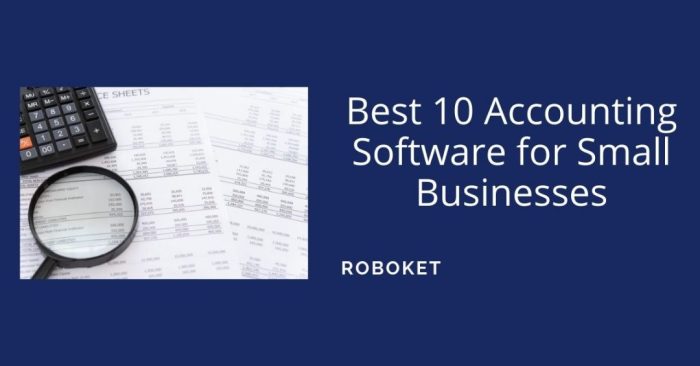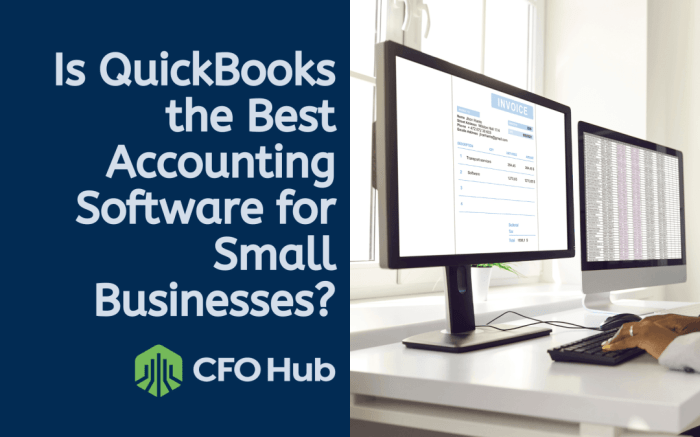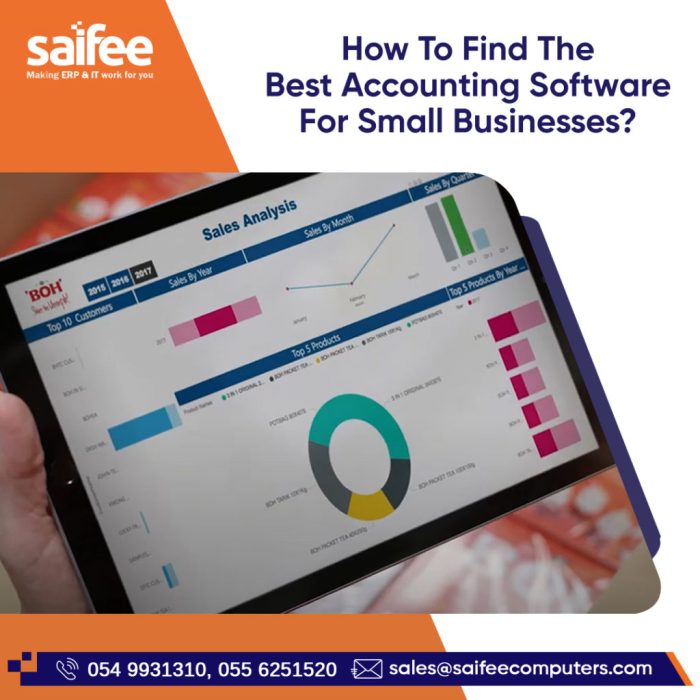Best accounting software for small businesses – Choosing the right accounting software can be a game-changer for small businesses. It streamlines financial processes, saves time, reduces errors, and provides valuable insights for informed decision-making. However, with a plethora of options available, selecting the best fit can feel overwhelming. This comprehensive guide explores the top accounting software solutions tailored for small businesses, considering factors like pricing, features, ease of use, and scalability.
We’ll delve into the nuances of each, helping you make an informed choice that aligns with your specific needs and budget.
Understanding Your Small Business Accounting Needs
Before diving into specific software, it’s crucial to assess your business’s unique requirements. Consider these key factors:
- Industry-Specific Needs: Certain industries have unique accounting requirements. For example, a retail business might need robust inventory management, while a service-based business may prioritize invoicing and time tracking.
- Business Size and Complexity: A sole proprietorship will have simpler accounting needs compared to a growing LLC with multiple employees and complex transactions.
- Budget: Accounting software options range from free plans with limited features to sophisticated enterprise solutions with substantial monthly fees. Determine your budget constraints upfront.
- Technical Proficiency: Consider your team’s comfort level with technology. Some software is more user-friendly than others.
- Scalability: Choose software that can grow with your business. Avoid solutions that will become limiting as your company expands.
- Integration Capabilities: Look for software that integrates seamlessly with other essential business tools like CRM, payroll, and e-commerce platforms.
Top Accounting Software for Small Businesses
Here’s a detailed look at some of the leading accounting software options for small businesses:
1. Xero
Xero is a popular cloud-based accounting software known for its user-friendly interface and robust features. It excels in invoicing, expense tracking, bank reconciliation, and reporting. Xero offers various plans to cater to different business sizes and needs. Its strong mobile app allows for on-the-go access and management.
- Pros: User-friendly interface, excellent mobile app, strong reporting features, robust integrations.
- Cons: Can be more expensive than some alternatives, limited offline functionality.
2. QuickBooks Online
QuickBooks Online is another widely used cloud-based accounting software, offering a comprehensive suite of features for small businesses. It provides excellent tools for invoicing, expense tracking, payroll management (with add-ons), and financial reporting. Intuit, the company behind QuickBooks, offers various plans, including tailored solutions for specific industries.
- Pros: Widely adopted, extensive feature set, strong customer support, industry-specific solutions.
- Cons: Can be complex for beginners, pricing can increase significantly with added features.
3. FreshBooks
FreshBooks is a cloud-based accounting software primarily designed for freelancers and small businesses that prioritize invoicing and client management. It offers a clean and intuitive interface, making it easy to create and send professional invoices, track expenses, and manage client communication.

Source: roboket.com
- Pros: Simple and intuitive interface, excellent invoicing features, strong client management tools.
- Cons: Limited reporting capabilities compared to Xero or QuickBooks Online, fewer integrations.
4. Zoho Books
Zoho Books is a comprehensive cloud-based accounting software that offers a wide range of features at a competitive price point. It includes invoicing, expense tracking, inventory management, and reporting tools. Zoho Books also integrates well with other Zoho applications, creating a unified business management platform.
- Pros: Affordable, comprehensive feature set, good integrations within the Zoho ecosystem.
- Cons: Interface might not be as intuitive as some competitors, customer support can be less responsive.
5. Wave Accounting, Best accounting software for small businesses
Wave Accounting is a free accounting software option for small businesses with basic accounting needs. While it lacks some advanced features found in paid solutions, it offers a solid foundation for invoicing, expense tracking, and basic reporting. It’s an excellent choice for startups or businesses with limited budgets.
- Pros: Free to use, user-friendly interface, suitable for basic accounting needs.
- Cons: Limited features compared to paid options, no mobile app, limited customer support.
Choosing the Right Accounting Software: Key Considerations
Selecting the best accounting software involves careful consideration of your specific needs and priorities. Here’s a recap of crucial factors:
- Ease of Use: Opt for software with an intuitive interface and user-friendly features.
- Feature Set: Ensure the software offers the functionalities you need, such as invoicing, expense tracking, reporting, and bank reconciliation.
- Scalability: Choose a solution that can adapt to your business’s growth.
- Integrations: Look for software that integrates with other business tools you use.
- Customer Support: Consider the level of customer support offered by the provider.
- Pricing: Evaluate the cost of different plans and choose one that fits your budget.
Frequently Asked Questions (FAQs)
- Q: What is the best accounting software for small businesses? A: The “best” software depends on your specific needs and budget. Consider the options discussed above and choose the one that best aligns with your requirements.
- Q: Is cloud-based accounting software secure? A: Reputable cloud-based accounting software providers employ robust security measures to protect your data. However, it’s crucial to choose a provider with a strong security track record.
- Q: Can I switch accounting software? A: Yes, you can switch accounting software. However, ensure a smooth transition by exporting your data from your current software and importing it into your new system.
- Q: How much does accounting software cost? A: Costs vary significantly depending on the software and the plan you choose. Some offer free plans with limited features, while others have monthly subscription fees that increase with the number of features and users.
- Q: Do I need accounting software if I’m a sole proprietor? A: Even sole proprietors benefit from accounting software to streamline financial management, track expenses, and generate reports. It simplifies tax preparation and provides valuable insights into your business’s financial health.
Resources: Best Accounting Software For Small Businesses
Call to Action
Ready to streamline your small business finances? Explore the accounting software options discussed above and choose the one that best fits your needs. Start your free trial today and experience the benefits of efficient financial management!

Source: cfohub.com
Answers to Common Questions
What are the common features of small business accounting software?
Common features include invoicing, expense tracking, bank reconciliation, financial reporting (profit & loss, balance sheet), tax preparation assistance, and inventory management (for applicable businesses).
Is cloud-based accounting software better than desktop software?
Cloud-based software offers accessibility from anywhere with an internet connection, automatic updates, and often better collaboration features. Desktop software might be preferred for businesses with limited or unreliable internet access, but generally lacks the flexibility of cloud solutions.
How much does small business accounting software typically cost?

Source: saifeecomputers.com
Pricing varies widely depending on features and the number of users. Options range from free (often with limited functionality) to several hundred dollars per month for comprehensive packages. Many offer tiered pricing plans.
What if I need help using the software?
Most reputable software providers offer customer support via phone, email, or online resources like FAQs and tutorials. Some offer dedicated onboarding assistance.
